#queer flags mean safety
Photo
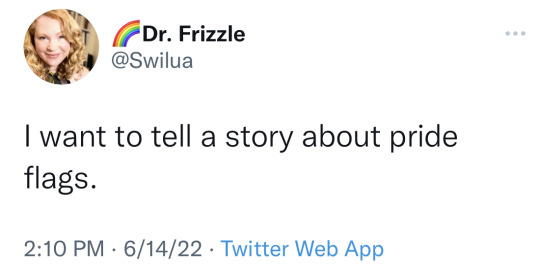
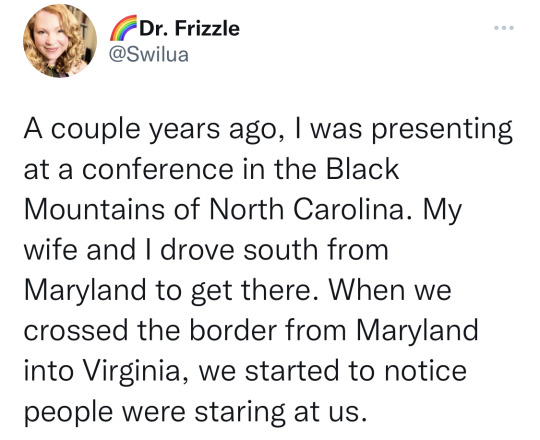
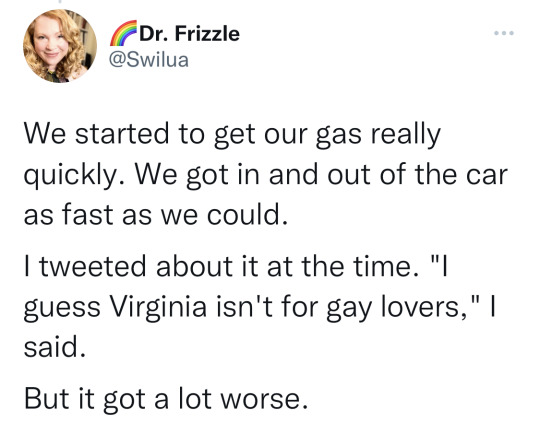
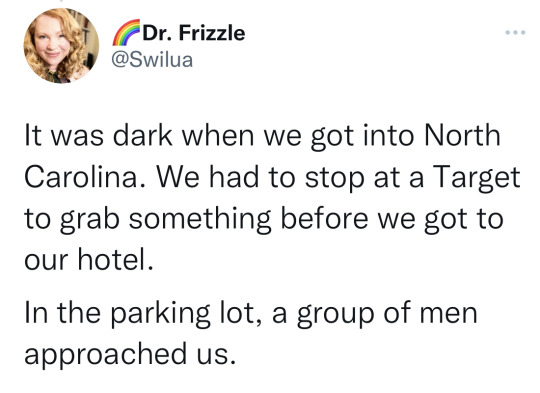
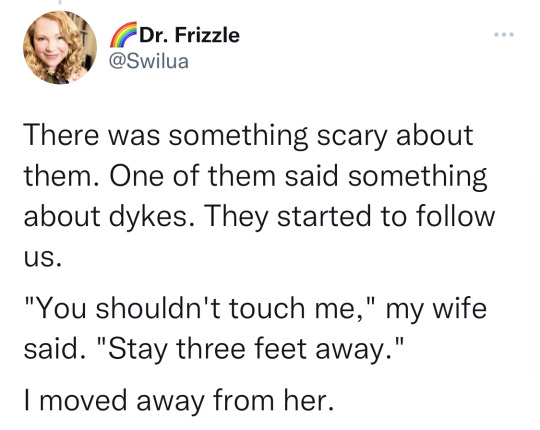
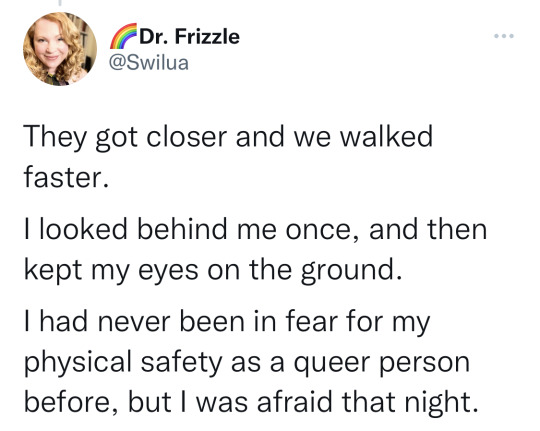
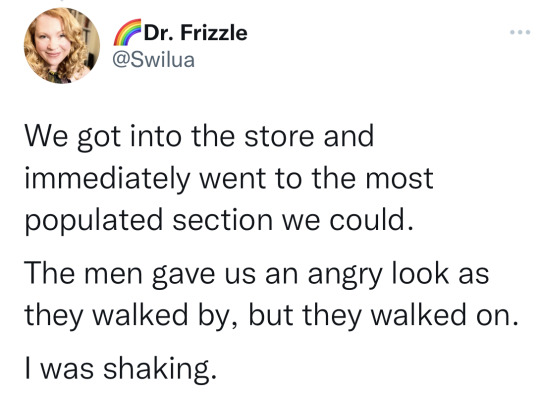
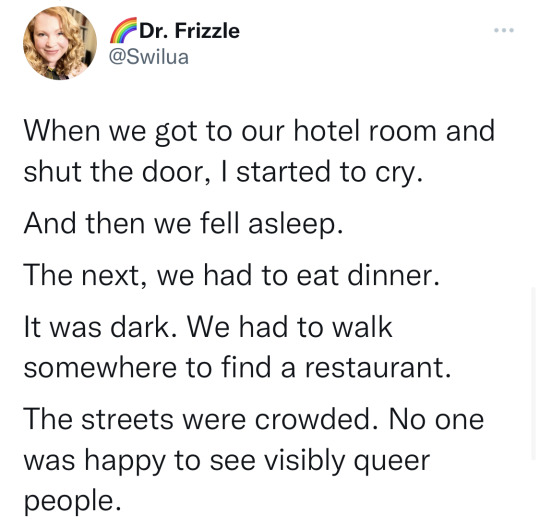
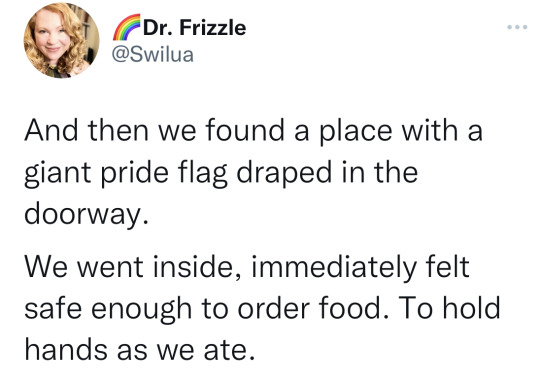
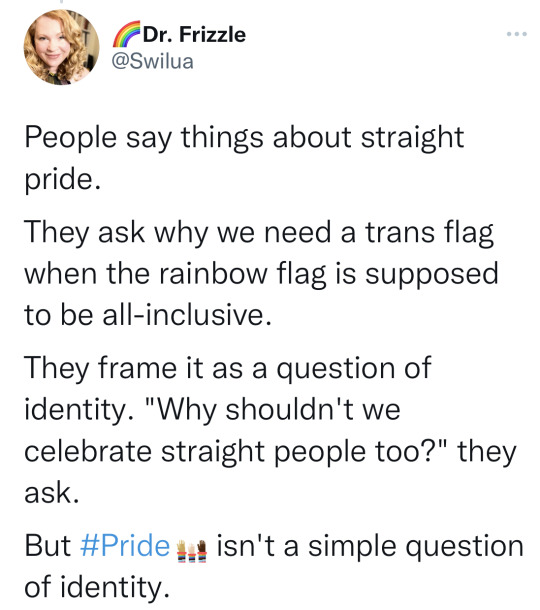
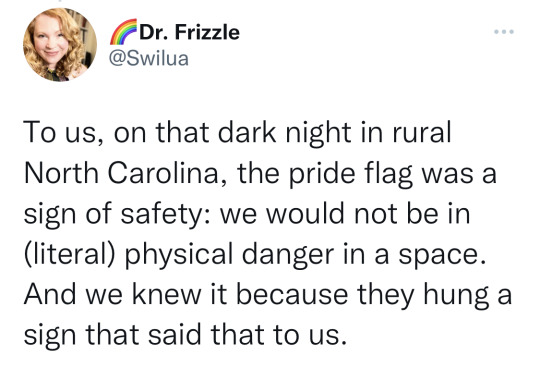
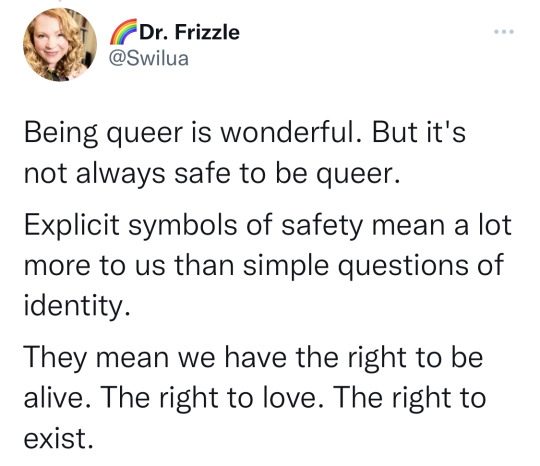
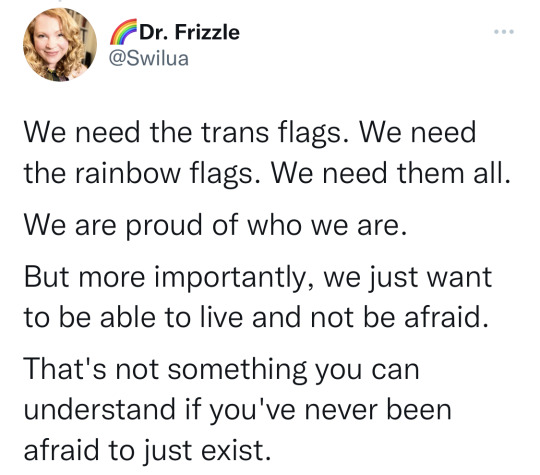
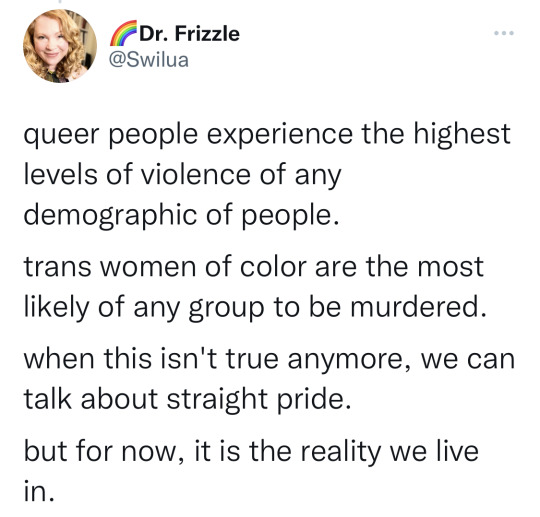

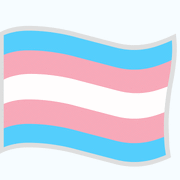
76K notes
·
View notes
Text
Nothing feels transgressive or even important anymore. Everything feels so hollow. So much of queer and disabled theory and labor activism is about bodily autonomy but what autonomy do we truly have? What kind of autonomy do the tens of thousands of newly disabled people in Gaza have? Those who were already disabled and died because they couldn’t access care? What kind of autonomy do queer people in Gaza have when their occupiers are flying pride flags over stolen homes? What kind of autonomy do laborers have here when collective actions that don’t directly pertain to their contracts aren’t legally protected? What does anything we’ve ever fought for and won here even mean if we can’t be bothered to fight alongside our colonized siblings? I think about Rachel Corrie and I wonder how can even we in the imperial core ever claim body autonomy if our bodies and lives are forfeit the moment we put them between a bulldozer and someone’s home? But it simply doesn’t matter to most people because so few of us would ever put ourselves in that position. We don’t care about liberation beyond the point where it directly affects our comfort. How can we ever call anything we do revolutionary or transgressive? Isn’t the point of pushing boundaries and crossing lines to push until all of us are together safely on the same side? I saw footage today of a Gazan man crawling on his belly to retrieve the body of someone who’d been shot and killed by a sniper at the gate of a hospital. Anything short of that is nothing to me now. We have to be willing to cross that line out of safety before I’ll call anything radical.
2K notes
·
View notes
Text
I know I said I would only be talking about Palestine this week, but I need to talk about this as well.
This is somewhat political and also a personal rant.
I stated on @crystalsandbubbletea (My main for those who are unaware) that I am a minor with ADHD, Autism, and possible anxiety who is part of the LGBTQIA+ community and is also Indigenous American (Ponca Tribe). Why am I mentioning this?
Because of the 'Kids Online Safety Act', AKA 'KOSA'.
If this bill gets passed, I will be unable to post Legacies or gain access to the things that inspire me to work on Legacies. I created Legacies because I wanted people like me to have a series to relate to, I also created Legacies to debunk multiple harmful stereotypes.
Here comes the personal rant part:
When I realized I was part of the LGBTQIA+ community (I was approximately nine years old at the time), I tried so hard to find pieces of media I could relate to, specifically media with queer neurodivergent non-white people. Unfortunately I didn't find that much media that covered those categories.
Fast forward to some time later (Specifically when I was fourteen), I ended up deciding that I can make a series that people like me can relate to. After multiple rough drafts in my brain, and multiple scrapped storylines, I came up with Legacies, a series that starts off as an alternative history of the world and then eventually becomes a piece of fanfiction. I eventually decided the first protagonist would be a nonbinary polyamorous lesbian living in the Ottoman Empire, and after some more time, I decided their name would be 'Alex Adil Emre Yukime'. I then started planning the second protagonist, this protagonist would be Hungarian-Palestinian that's nonbinary, polyamorous, trixic, demisexual and demiromantic (Note: All the arcs Berat is in takes place in the 2500's).
I was ultimately satisfied when I finalized the storyline, and was happy.
(Rant ends here)
Unfortunately that happiness wouldn't last long when I learned about KOSA. If KOSA gets passed, Legacies will be unable to reach it's targeted demographics, and that will mean all my hopes and dreams were for nothing.
I won't be the only one affected, many more people will also be affected, specifically LGBTQIA+ youth. We will be unable to find anything LGBTQIA+ related because it will be flagged as "Not safe for minors". Trans people are already facing censorship (Looking at you, Tumblr staff) and this bill will make it worse.
So please, call and email your representatives, and tell them to not let KOSA pass. This bill is censorship and censorship is a form of facism.
#the official legacies blog#the-official-legacies-blog#legacies by crystalsandbubbletea#kosa bill#kids online safety act#stop kosa#lgbtqia+#lgbtq+#lgbtqi+#lgbt+#nonbinary#lesbian#transgender#trans#genderfluid#pangender#xenogender#bigender#gay#bisexual#pansexual#omnisexual#demisexual#demiromantic#aromantic#asexual#aroace#aroace spectrum#call your reps#kosa
490 notes
·
View notes
Text
Official statement on why Izzy's death affected me so much
Our Flag Means Death, is, at it’s core, is a show that focuses on queer joy- a form of therapy for those that have been raised on queerbaiting, shipping minor side characters, or watching, when nothing else is available, queer tragedies. You know how it goes- the two main characters, both male, have chemistry. They say things to each other that seem weirdly like declarations of love. They look at each other with love in their eyes. You see these things and the main man gets married off to a badly written, unfinished female character and is left feeling empty. The best friend dies for the main character to live. When everyone talks about how cute the main couple are, you want to scream all of a sudden, because nobody can see this love story play out except you. It’s queer, it’s tragic, and nobody else can understand it.
Not Our Flag Means Death. From the moment it aired, it was praised as a show with unabashed queer joy, which means more than I can possibly say. The two main male characters meet, they have chemistry, and they fall in love. It’s not implied, or hinted at, but blatantly obvious. Their romances and the queer romances around them attracted so many queer fans who felt that after so many years, this type of show was a vindication for what they had been through with other media.
In this show, piracy itself was that of a found family. Though Stede Bonnet and the crew of the Revenge start off with many differences, the core of the show centers around a theme that many queer audiences are attracted to: found family. The Revenge was depicted as a safe space, where everyone could express themselves freely, a refuge from a world of judgment. Queerness was not only accepted but normalized on The Revenge. No homophobia, no coming out, no typical complications of queer romance. Just love and safety. Warmth, which was Ed Teach wished for in purgatory. Which was what he found on the Revenge. The ship was a safe space that so many queer audiences had dreamed of.
Well, a safe space except for one person: Izzy Hands, Blackbeard’s First Mate, who was a man painfully stuck in the wrong genre. This is the general consensus by both fans and the cast: Izzy, Edward and their crew had been in a gritty action movie, whereas Stede and his crew were in a muppet movie of sorts. While the majority of Blackbeard’s crew quickly acclimates to and celebrates the change, Izzy doesn’t.
And right away, many fans felt a deep attraction to Izzy. The reason that Izzy couldn’t get Edward to love him was because, in the end, the only way that Izzy knew how to love was through blood. To give and receive pain in an action movie is one of the greatest forms of love, but Izzy fails to realize that Ed is not in an action movie anymore. He is happy with this stability, and the reason that so many people felt Izzy’s presence so was strongly was that he wasn’t.
So many queer people are, in a way, addicted to tragedy. Tragedy is all that is represented in queer media for the most part, or was until very recently. Take Achilles and Patroclus, one of the most celebrated and recognized queer love stories of both ancient and modern times. Why that one? There are other greek love stories, many of them queer. The tragedy of it- Patroclus’ death and Achilles’ rage- made it all the more appealing. Many in the audience of Our Flag Means Death were not comedy fans, they were horror or drama fans, attracted to a comedy because of the love story. But Izzy, to them, was a physical representation of who they were, carrying an awareness of homophobia, of blood and pain that so many queer relationships had previously been illustrated by (i.e. Hannibal). Though Ed may not have understand this type of affection, the audience did- Izzy’s Otherness from the crew despite it’s safety, his expressions of love and his unrequited love story were all things that the audience were familiar with feeling.
If Ed and Stede were good queer representation, Ed and Izzy, for example, were a foil of that. They were evil, messed up, and fed into the worst parts of each other because it brought them closer. This is a theme present in a lot of queer media, and by extension, queer lives: “if you love me, Henry, you don’t love me in a way I understand”, is an excerpt classic queer poem about unrequited love that fits the situation. The very reason Izzy stuck in people’s heads because he was of a different genre. His grittiness and bitterness made sense to the audience. They saw Izzy and saw what was familiar. He was exquisitely written, simultaneously making even casual audiences both hate him, and against all odds, find him oddly endearing. The idea of this man sacrificing every inch of himself for an unrequited love was a concept of tragedy, leaking into a comedic show.
So fans projected onto Izzy. He was a catalyst for the heartache, for the audience’s sheer inability to have a happy show. For one reason or another, some of the audience simply couldn’t live with a show that was all fantastical, which I theorize is because they couldn’t see themselves in it. So Izzy became the epitome of queer suffering: pining longingly after another man that couldn’t understand him. This projection of suffering, however, led to a new wish: happiness for Izzy. If Izzy in Season 1 was a tragedy, assimilating him into the found family in Season 2 would have elevated the safe sense of the ship all the more. It would have proved to so many of these Izzy Fans that yes, even though you view yourself as unloveable, even though you see yourself as Israel Hands, Villain, even he can be loved too. Why can’t you be?
And Season 2, for the most part, delivered beyond our wildest dreams. Izzy had people who cared about him. And though the genre shifted into the darker, Izzy himself shifted slightly to the comedic side as well. His life, which had been centered for so long around a man that didn’t reciprocate his feelings, was gone. He started a new life, and this life, again, focused on queer joy. The queer joy from Season 1 was suddenly for everyone, even those like Izzy that couldn’t have understood it. He sang, he whittled, he talked about feelings, he dressed in drag. Many elder queer fans also saw Izzy as another metaphor, too: that queer joy can be attained overtime. You don’t have to have had it the whole time, but you can accept yourself even when you are older. The message of Izzy was one of resilience and stubbornness, one that the queer community needed to hear: that you don’t have to be like this, you don’t have to create pain for yourself. You don’t need to watch tragedies all the time. You, too, can heal from the past.
And then, the season finale happened. By this point, many argued that Izzy had stolen the show. Con O’Neil’s acting mixed with his general arc of self acceptance had made him a fan favorite. In the last episode, it is Izzy himself who sums it up perfectly, accepting that he belongs somewhere despite his pain and flaws. Despite the darkness within him, he was still accepted and loved. He says it right to the face of Prince Ricky, who thinks himself above it all. That piracy, a metaphor for otherness, wasn’t actually about being alone; it was about finding others that understood you when nobody else could.
Listen, this show is known for it’s nonsensicality. In the finale of Season 1, Lucius is thrown overboard by Ed and survives by simply swimming to another ship. Stede reunites with his crew by sailing a rowboat. Buttons turns into a seagull. Stede stabs Ed for a comedic bit. Earlier in the season, Izzy himself gets shot and survives. This queer joy show was celebrated for being, well, joyful. Even when things like getting thrown overboard did happen, they were, ultimately, a blip in the character’s journey towards acceptance, healing, etc, which was what made the show unique. Our Flag Means Death, whose audience had been living for years off of the “Bury your gays” trope, was adored because it illustrated a world where things didn’t have to be that way. A place where the impossible, such as Izzy Hands being loved, could happen. This show was one of survival.
But not for the one person that was seen to struggle with this concept the most. Not for the one person that was a metaphor for belonging in this place, who became, over the course of a season, the embodiment of the message itself. Not for the Unicorn, the very symbol of this magical, nonsensical ship. Not for the most stubborn, most indestructible, most enduring (queer) person in the show. Not for Izzy Hands.
This trope, honestly, was one that many have seen before, both in mainstream and queer media. A character, previously shown to be a villain or else to have gone through a lot of pain, is shown to heal, to get better, and then to die in order to “complete their arc”. This trope is common: Loki, Cas. even Ted Lasso, who doesn’t die but goes back to the very place that broke him in the first place. But the reason that Izzy’s death, while it might have been expected in another show, felt like a betrayal in this one is because it was known for subverting those tropes. From the “Bury Your Gays” to the “Up For Interpretation”, it was known to look those tropes in the eyes and say “fuck you, these people deserve to be happy”. And this did happen! Except for the one character who’s healing journey was one of the most relatable, at least to queer audiences.
What also made it so jarring was that all the other characters got to be happy, except for the one that had struggled with the idea of happiness the most. In the scene immediately after Izzy is buried, Lucius and Pete get married. In the scene after, a montage of queer joy and found family is shown amongst the whole crew. In the final scene, Ed and Stede, our main queer couple, are shown healing themselves and starting a new life together. The last shot, however, showed Izzy’s grave, visited by Buttons the seagull while Ed and Stede had dinner. A tragedy in it’s finest. It wouldn’t have been difficult for Izzy to live. Because, in the end, his death meant nothing. His healing meant nothing. He died and was moved on from in a matter of seconds. He was, as I mentioned, the catalyst for tragedy, more specifically, queer tragedy. But because of this, of his genre, Izzy didn’t get to live. He had to die in order for the rest of the characters to keep living in this fantasy world. This death was, in a way, a preservation of these other love stories.
I maintain, however, that it would have meant more if Izzy had lived. If he had been able to show to us that yes, despite what you have been through, despite what you may have inflicted upon yourself, you can switch genres. It’s possible. Izzy’s survival up until that point had been a profound testament to many that it is possible to heal, that queerness does not have to mean sadness. It would have continued to be a testament to that if only Izzy had lived. And so, this pirate that we latched onto, not in spite of his darkness but because of it, was buried on land on the side of the road.
As a side note, many previous incidences in the story point to the idea even though Ed and Stede will definitely stay together, it’s uncertain if the inn would have worked out. It’s likely that, being a whim, those two might have chosen to move, or go back to the sea, or sail to China. If this is true, they would have left Izzy’s grave by itself, like a family pet buried in the yard. If this is true, Izzy Hands, a metaphor for belonging, would rot alone.
Long live the tragedy addicts. Long live the Richard Siken poems. Long live Izzy Hands.
*When I talk about the "fandom" I am referring to the canyon.
#izzy hands#izzy hands apologist#izzy canyon#our flag means death#ofmd finale#ofmd#izzy hands death#izzy deserved better#ofmd fanfic#i guess#ofmd canyon#con o'neill#tragedy#oh uh happy new year#ofmd meta
271 notes
·
View notes
Text
Two More Stalkers
So I'm drafting this post on October 19, 2022, hoping that I won't have to use it, but getting it set up as a contingency. Just in case.
Lots of screenshots under the cut, but TL;DR:
I have two stalkers who feel entitled to my work and writing, and have been stalking me because I didn't write their historical blorbos to their personal satisfaction and because I haven't written queer characters to their exacting specifications (specifically, they want what amount to Gold Star Lesbians with modern-style adopted children). In the course of their stalking, they have made a hate-blog specifically to target me with insults, and when that failed to get a response, escalated to making a new AO3 account specifically to write hatefic of my work and "gift" it to me.
If you see this post having gone live, I ask you to please review it and reblog it, because I am preparing this contingency in case they escalate to the point of trying to publicly defame me, and if I've hit "post", that means they're actively trying to get people to hate me.
So, without further ado...


Here are screenshots of their intro posts (still available on my Discord server if anyone wishes to see the evidence). Essentially, they came because of their interest in the historical King Macbeth and the mid-11th century, which is where and when my story, A Thing Of Vikings, is set. The basic concept of the story is that the first How To Train Your Dragon film is dropped into Real Life history in the 1040s AD in the Scottish islands, and events ripple out from there, changing history as a result.
Some red flags began to wave in regards to these two, as nessie wanted to know what the status of his historical blorbos would be in my writing, and did not take it well that they would either A) be dead, B) be reduced to insignificance by changes in the historical timeline, C) be someplace else, or D) not exist at all, due to changes in the timeline. He ended up quietly leaving after the following discussion:
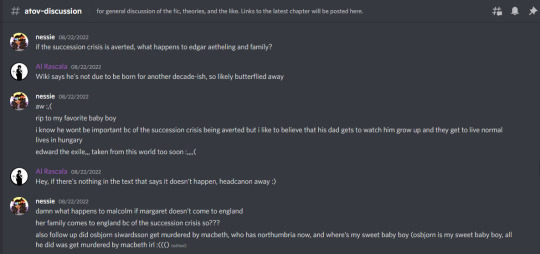
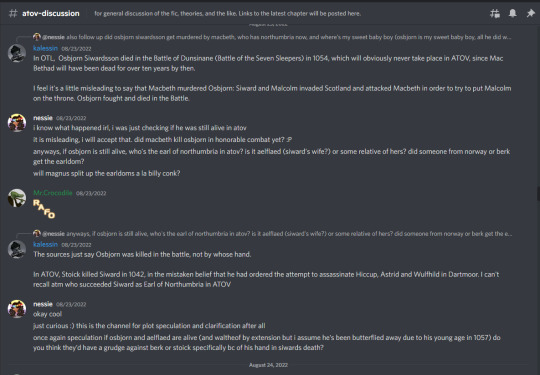
He then left a few days later on Aug 28th.
Fast forward to October 2nd.
the threat of tortellini starts a discussion as follows:
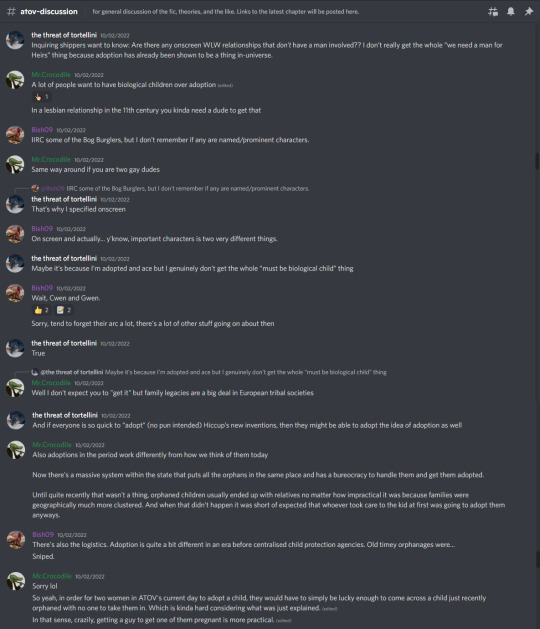
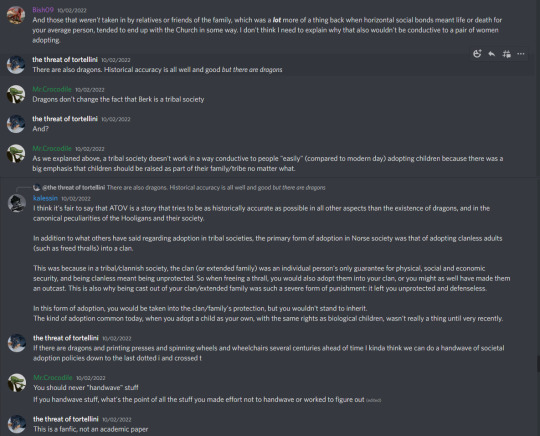
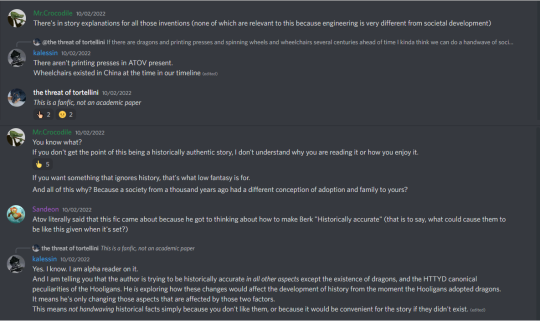
At the end of this exchange, the threat of tortellini leaves the ATOV Discord server. To sum up the above, they wanted for me to jettison the core conceit of a piece of writing that I have been working on for six years because they wished to see specific developments catering to their personal desires happen in the text. In short, "Screw your writing integrity, I want you to write it for meeeee!" and then stormed off the server when they were told no.
Two hours later, I am followed by @courtlycringe. Now, I vet my followers for personal safety reasons, due to having experienced harassment and stalking in the past, and immediately saw that this new follower was... unique.


For obvious reasons, I promptly blocked the two people in the notes for these posts, as well as the courtlycringe blog itself. The next morning, October 3rd, I remembered nessie's fixation, and promptly pulled on the threads with the intro posts, putting together that @themischiefoftad is the threat of tortellini and that @malcolm--of--scotland is nessie. (Note the dates on the posts, too; Nessie had this hate blog already going before his friend stormed off of the server)
Confirmation came after a few of my friends interacted with them:
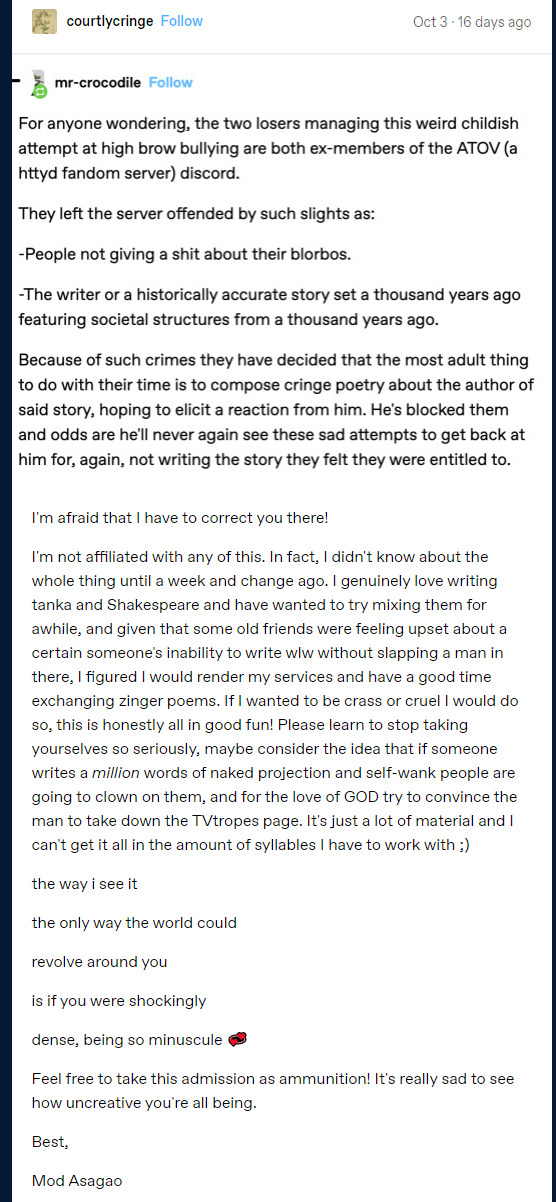
(Although it should be noted that I don't believe that courtlycringe is/was run by anyone other than my two stalkers, given the timeline).
I do a little more work, track down their AO3 accounts, and block them. I expected that to be the end of it.
It wasn't.

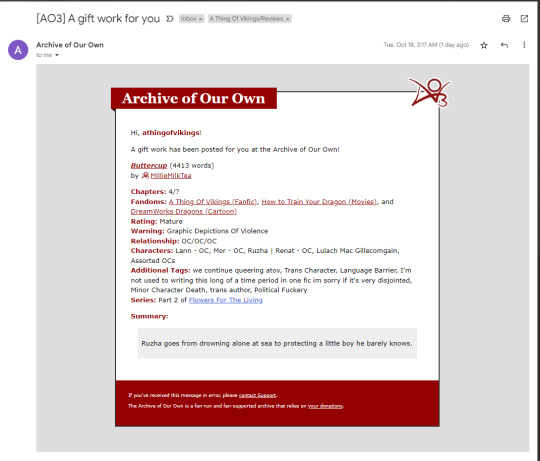
In short, these two made a new AO3 account, MillieMilkTea, and wrote some extremely nasty hatefic using my characters and targeting my work. The Necessary Components For The Fall Of An Empire is a giant middle finger to me personally, with my male main characters being brutally and graphically murdered by the female characters (especially their personal blorbos) and having everyone cheering for the deaths, and the female characters going off to be good pure lesbians. Nothing more and nothing less.
I declined the "gift", and have reported them to AO3 Abuse as of the writing of this post on Oct 19.
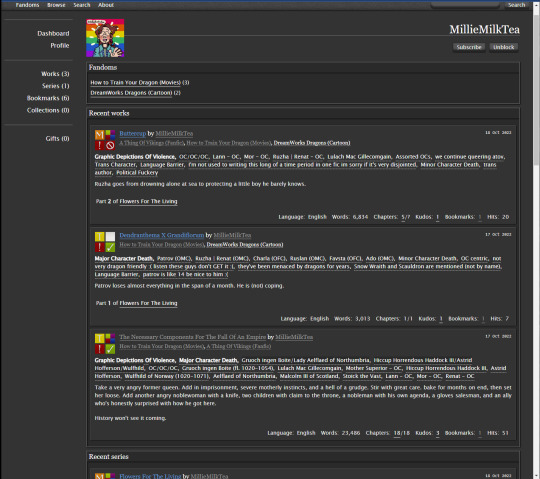
However, given that they have written thirty-three thousand words of targeted hatefic, likely just in the past few weeks (the account itself was created Oct 11), I am sure that they will continue to escalate. I will keep this post updated and ready to post in case they shift from targeted harassment to defamation and libel.
524 notes
·
View notes
Note
How can you support Palestine? It’s constantly ranked as one of the worst countries for lgbt rights/safety and people who are found out face death in many instances. A man was decapitated in the street for being found gay and gay sexual relations are illegal with a penalty of jail time… Who do you think you are crusading for? The reality is if you went there with a rainbow flag walking down the street you would not be ok. Queer people flee to Israel for safety because society there as in many Islamic regions is notoriously anti-lgbt. Israel bought their land and have every right to defend themselves contrary to what the people wanting to wipe out their entire country believe
Hello!
I support Palestine because every person has a right to live. Because what is happening is a genocide. It's a fact. You can argue about it to the kingdom come, but it's done by the book genocide and, since it's a fact, opinions can't change it.
With this being said, I'd like to address two specific points you made.
You can't shame me - or anyone who is queer and supports Palestine - by talking about hate crimes against queer people or describing them. Because before that you should look at your own country and check when was the last time a hate crime happened. I bet it'll be recent. Hate crimes and homophobia are not exclusive to arabic/muslim countries. This point of view is narrow minded at best and racist at worst - either by the lack of education or lack of interest in the world.
"The reality is if you went there with a rainbow flag walking down the street you would not be ok." - At this point I thought you might be a troll because saying this to me? I really am the wrong person to come to with this. I live in Russia. It's illegal to wear rainbow flags here and you will go to jail for it. Chechnya has torture camps for gay men. There's police raids in gay bars in Moscow happening regularly. Trans people are in danger of being forced to detransition. I live in the scenario above, you don't need to scare me with it out of supporting Palestine.
But my point is - I support Palestine as a queer even more as just a human, because I know what it means to live like this. Just because Palestinian queers might not be all loud and proud doesn't mean they don't exist; just because being gay is condemned and puts one's life at risk doesn't mean queers just suddenly stop existing.
And I also know - just as I have support here (my closest friends are straight women with traditional beliefs and they are very comfortable with me being gay, most people I know are not violently homophobic) Palestinian queers have their support, their communities and their people who love them and care for them. And they need our support as well. We don't get to turn our back on our fellow queers just because they happen to live in unsafe places. (and again, this kind of belief stinks of racism or of the need to broaden your worldview horizons. Believe me, the majority of queers are not white and don't live in lgbt-friendly countries)
"Israel bought their land and have every right to defend themselves contrary to what the people wanting to wipe out their entire country believe." My point in this is also really affected by me being Russian. (I'm sorry if some of you are uncomfortable with it, I can't really change it.)
You see, these reasons are very similar to what I've heard when Putin tried to justify the attack on Ukraine.
"Israel bought their land" is just as disgusting to me as "Ukraine didn't exist until 1991". "Israel has every right to defend themselves" is Putin's "We're defending ourselves against the collective West". Which is fucking nonsense.
And this is done by the book propaganda - and I'm not saying this because propaganda is a big word people like to throw around. I know this because I studied propaganda for my bachelor degree as a part of "changing public's opinion" course - me and my classmates were trained in this. They take some historical facts you can't deny or make an enemy out of someone (them vs us) and manipulate it to fit their rhetoric. Once you know how to recognise it you'll never not recognise it again.
Israel is not defending itself by targeting civilians and sniping children - they killed more children in these months than Russia in two years which is horrifying to me - they confirmed multiple times they want to erase Palestine from the face of the Earth. These words don't mean self-defence. It's a colonial power that really wants to show how powerful they are and how unstoppable they are. And again, I know this from the side of the colonial power. For me, people who side with Israel are the same people who side with Russia - and it makes me sick.
Also please don’t assume that people who support Palestine want to destroy Israel, this is again, very narrow minded. Saving people from genocide by committing another genocide? This is plainly stupid. The world is not black and white, it's more complicated than just taking sides. I'll give an example: I'm queer and I know I'll be in danger if I ever come to Dagestan (close to Chechnya) - but dagestan people fund rise to send humanitarian aid to Palestine and I donate to them, because people are dying and I don't really care if people who'll help them are homophobic to me. Because it's not about me.
But there are moments in history when you need to take a stand, and I will not stand with Israel. (or Russia for that matter)
Anyway. Stand with Ukraine. Free Palestine.
#palestine#free palestine#abby anderson x reader#don't come to me with the same points all zionists have; I've heard way worse said to my face irl#and especially don't weave queer safety into it
109 notes
·
View notes
Text
it is so painfully obvious that white gays have never been oppressed or marginalized outside of their queerness. y’all see Mizu, a woman marginalized into hiding her gender for her own safety and you think it’s a story about you. You’ve never been discriminated against as a woman of color. All the people on this site that I have seen saying the same things as me are other women or people of color, with few outliers, who understand what Mizu is going through.
I’m sorry that you’re starving for representation but so are we, if you want to project go watch Nimona or Our Flag Means Death. If you want to understand, you need to sit down and shut up.
if you think this is a story about a trans man you are missing the point
if you think this is a story about a man you are missing the point
#media as a window and a mirror. Blue eye samurai is a window for y’all you are on the outside looking in#blue eye samurai#mizu blue eye samurai#women of color#fandom racism#racism#that’s not even TALKING about how being biracial is a major part of the story#The people of her own culture aren’t accepting of her because she has parts of another#it is not a metaphor#I’m fucking biracial and bicultural I know what the hell im talking about
147 notes
·
View notes
Text
OK, people are still being jerks
It's just a stupid show! Why do you care or give money to this when Bad Thing is happening in the world?? Omg, you are so embarrassing!
I tell you, a Bad Thing has been happening every day of my life on this earth, and I still want some enjoyment out of my squishy mortal existence.
There is an emotional burden to living. We can't live our lives stressed and in anxiety all of our waking moments. We need entertainment, leisure, and play. This helps our brains rest.
But if we're going to Go There because of these "activists", let's talk about fascism a bit, shall we? So many of us read 1984 in school, right? With the Newspeak and novel-writing machines? It's a dystopia that cuts language down and prints out its entertainment without a creative process behind it. Fascism is anti-intellectual and has a disdain for the arts, only wanting to recycle the past. Fascism marginalizes those with less power. Fascism wants to control all of the mass media. Fascism reveres corporations. ... fascism is bad, btw.
Representation in media is important. Stories are a big part of how we pass down history, share culture, and build community in a society. No, the shows that people are upset about losing may not be Shakespeare, but most things aren't. I was going to go on a longer rant here, but you know what? You Get It or you Don't. The arts and telling inclusive stories are Important, even if it's not Life-or-Death. People can care about more than one thing at once.
If we're looking at what's happening with Max right now, they're cutting out queer shows, shows with large BIPOC casts, and shows with female leads. We're watching these streamers and companies dissolve into one another (WBD/Max wants to merge with Paramount, remember). We're watching shows that aren't led by cishet white males disappear and shows that aren't cookie cutter, strictly-by-the-numbers IPs or procedurals or cheap reality shows disappear. Maybe we'd be allowed to get bare minimum tokenism if we're lucky, and if we're extra lucky, get some marketing! There are some exceptions in streamers... now. Two years ago, HBO Max was the place where new stories could be told safely, and nothing is stepping in to take its place now. Sure, some bad shows may have been canceled back in the day, but that isn't what's happening right now, is it?
People creating these stories deserve a living wage, even if they don't pump out Record Profits, and storytellers (and the audience!) should have some safety in being able to finish the story in some manner. Almost all of the financial difficulties facing Max now are due to mismanagement at the executive level, not quality of products. Any show that does something new or tells a different perspective does not last. It's not even about "numbers." Our Flag Means Death outperformed everything, but here we are. OFMD is a rarity now that it has the loud and passionate fanbase to make waves.
So, here are some petitions for three shows canceled this week on Max. (Remember Max is planning to throw over $125M at a season of TERFy wizards) Fandoms should support each other!
Our Flag Means Death
Rap Sh!t
Julia
82 notes
·
View notes
Text
i feel like a lot of people don’t understand or realize that a lot of lgbtq people don’t consider their queerness an important part of their identity. a lot of them don’t celebrate pride, don’t tell people, don’t talk about it, don’t come out, and don’t put themselves in queer environments or cultures.
this doesn’t mean that they’re ashamed of themselves and don’t want to be part of the lgbtq community, it’s just not an important part of who they are to them. and that’s completely valid!
this can be for many reasons, such as safety, how they were raised, their environment, or they would just rather live their lives with their queerness less of a focus.
my brother, for instance is bisexual, but he lives as if he were just a straight man. he went to pride with me, but he didn’t celebrate himself. it’s not internalized homophobia, it’s just not his thing.
i feel like a lot of queer people have this expectation that everyone needs to be waving their flags and letting everyone know and wants to have their queerness important, but it’s really not that way for everyone. it isn’t really realistic in society and adulthood.
29 notes
·
View notes
Text
Trans Jaime Headcanons:
Wears hoodies and baggy clothes out of habit now. But he spent like the entirety of high school wearing hoodies, even when it was 90+ degrees outside because dysphoria is a bitch.
He got top surgery during college. It was paid for by the schools LGBTQ club using a fund that Bruce Wayne created (one of his adopted kids, Dick Grayson, is trans, so it’s a cause he’s super passionate about).
Also started T in college, but he has to ask someone to do the shot for him because he’s scared of needles. Usually it’s Bart.
When Khaji finally figures out what the conflicting data they’re receiving from his body means they offer to alter his body so it produces testosterone naturally. It’s one of the few changes he’s cool with.
First time he cut his hair was in elementary school. He did it himself, standing in front of the mirror with safety scissors and hacked at it until there were chunks in the sink. His dad was the first person to see him afterword and simply took him to the barbershop to get it cleaned up.
The second someone at church tried to say something, his mom shut that shit down. “This is mi’ hijo, Jaime. He has always been Jaime.”
The first person he tells is Uncle Rudy. This trend continues when Milagro comes out to Rudy first and he’s just like “do I give a queer vibe?”
He lets Rudy paint his nails sometimes, black on every other finger. He figures if Rudy can do it, then he can too.
They all expect nana to be a little confused at first, but surprisingly she’s the quickest to adapt to his new pronouns. She also makes him his first binder.
Jaime’s got the trans flag in his room along with the Mexican flag.
He’s so excited when he gets to shop in the boys section for the first time. Back to school shopping actually becomes fun, and he begs his mom for light-up dinosaur sketchers until she finally caves. They don’t really have the money, but Jaime had looked so freaking happy running around the store with them on, so obviously she couldn’t say no.
Alberto deadnames him exactly One time, because he’s been at the auto shop all day and he’s tired and not thinking. Jaime’s playing Pokémon in the living room and it’s just bordering on too loud so he tells him to turn it down before he’s realized the wrong name has slipped out. The hurt look on Jaime’s face is enough to ensure he never does it again.
Milagro was young enough when he first started going by Jaime that she doesn’t even remember his deadname. Someone at church asks her how (deadname) is doing one time and Milagro is like ??? Who tf???? I do not know them.
His family tries to be so supportive at first that it becomes kind of comedic. They buy him every blue thing they come across. Bed sheets? Blue. Socks? Blue. Folders for school? Blue. Snacks for his lunch? Blue packaging. Jaime feels like the Mexican Percy Jackson sometimes.
#probably will add more later#but I can’t put everything or this list will be a mile long#trans Jaime my beloved#he means so much to me#jaime reyes#blue beetle
84 notes
·
View notes
Text
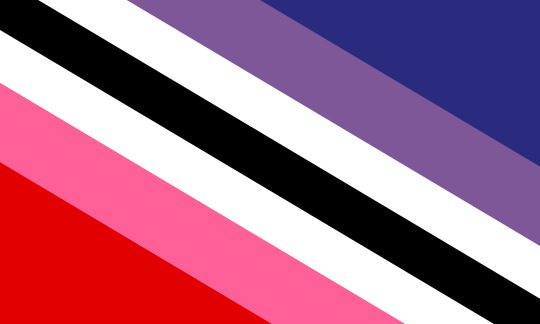
The consensual kinkster/paraphile (CKP) flag! This flag does NOT include nonconsensual kink practices or attraction to beings that cannot consent, but is otherwise inclusive of all kinks, fetishes, and paraphilias. CKPs consider consent of the utmost importance and work to keep kink spaces safe, accepting, and inclusive, and promote learning about the shared history of the kink and queer communities. We also work to protect those who are vulnerable, like children and animals, from being exploited sexually under the guise of "kink". This label is only to be used by adults.
Stripe meanings:
The diagonal stripes are meant to call back to the earliest kink pride flag (and one of the earliest pride flags in general), the Tony DeBlase leather flag.
The navy stripe is from the modernized leather pride flag. It represents the BDSM community, its subcultures, and all consensual kinks and paraphilias falling under the BDSM umbrella. It also represents trust.
The purple stripe is from the (cheshire) mad pride flag. It represents those with sexual neurodivergences such as those with sexual intrusive thoughts from OCD, sexual trauma survivors, hypersexuals, and disordered paraphiles*. It also represents acceptance.
(*it does not represent non-consensual paraphilic attraction, as CKPs do not condone or encourage attraction to nonconsenting beings, or engaging with this attraction in any way. People with these paraphilic disorders are not excluded from the CKP community as long as they are pro-recovery, anti-contact, and do not consider their disorders to be kinks or their attraction something to be proud of, but this flag doesn't represent that attraction. It can, however, represent recovery from that attraction and supporting the recovery of others.)
The pink stripe is for partialists, morphophiles, and other body-related kinks and paraphilias. It represents those who are attracted to certain specific parts of the body, certain body types, body parts of certain sizes, body modifications, transformation (tf), macrophilia, microphilia, etc. It also represents desire.
The red stripe is from the objectum flag and is for fetishists and objectophiles (and kinky objectums who prefer to just use objectum). It represents those with fetishes for/attraction to objects, including certain materials, certain clothing, certain toys/apparatuses, and other object-related kinks. It also represents liberation.
The black stripe represents consensual kinks and paraphilias that may be considered "gross" or "weird" or "scary", such as ones related to bodily functions, CNC roleplay, and potentially dangerous kinks (e.g. knifeplay, breathplay etc). It also represents solidarity.
The white stripes represent commitment to keeping the kink community safe for those in it, keeping minors out of it, and prevention of those who promote or engage in nonconsensual acts or feel attraction to beings that cannot consent from co-opting the kink label/community and trivializing the damage those things cause. They also represent consent.
CKPs are PRO:
RACK (risk-aware consensual kink). An alternative to SSC (safe, sane, consensual) that isn't ableist or exclusive of potentially unsafe consensual kinks- many "safe" kinks such as bondage have safety risks and shouldn't be labeled as safe as this is misleading and potentially dangerous misinformation. Risk-awareness requires knowledge and implementation of all possible safety measures, and recklessness and irresponsibility aren't acceptable in the kink community.
Kink pride/kink at pride. It is against sexual acts at pride (or with non-consenting viewers in general), but supportive of kink gear and pride flags being displayed at pride parades, as they have been from the beginning.
Harkness test. For those unaware, the harkness test is a guide to ethical attraction involving fictional beings. It requires that the being must be sapient and of an age that is capable of consent (or adult-equivalent ageless beings such as demons), and that as long as consent can be communicated and established, it's ethical.
Inclusion. CKPs are inclusive of aspecs, mspecs (including mspec gays/lesbians), ethical non-monogamy/polyamory, objectum/conceptum, cupiospecs, autospecs, xenogender, neogender, nondysphoric, intersex, altersex, aldernic, gender nonconforming, agab nonconforming, pronoun nonconforming, and all system/alterhuman origins/types.
Sexual health, including inclusive sex education, freely available contraception, freely available abortion, freely available HRT, freely available sex/gender affirming care, and freely available preventative medication (like PrEP). It also uplifts and supports those with STIs and sexual disabilities/dysfunctions and does not shun or shame them for having them. It also supports those with non-sexual disabilities that cause difficulty with sex, or causes others to infantilize them/take away their sexual agency.
Reclamation. Beings should be allowed to reclaim slurs against them and the sexualization/fetishization of their identities/bodies.
Having safe, accessible, inclusive spaces for kinky adults to socialize and play in consensually without fear or shame.
CKPs are ANTI:
Sexualization of non-consenting beings, including drawings, writings, and any other depiction- real or fictional- meant to be sexually attractive to those with non-consensual paraphilias.
Incest/consanguinamory.
Proship/profic/"fiction doesn't affect reality".
Radqueer.
Kinkshaming. A consensual kink squicking you out doesn't make it bad or worthy of ridicule. (This doesn't refer to jokes between friends and the kinkshaming kink as long as everyone's cool w it).
Calling people pedophiles or zoophiles when they are not (e.g. furries, petplayers, ABDLs).
Harassment, bullying, grooming, and all other forms of abuse.
Slut-shaming and prude-shaming.
Cops. Cops can and will arrest you for consensual kink!
Whew... this is long and it took forever to refine, as I took this very seriously. Sorry for no image description, I'd appreciate it if someone could make one for me to reblog, or I'll add one myself later when I have the spoons. I'm very proud of this!!! :3
DNI with this post or account if you intend to be an asshole and insert your shitty anti-kink or pro-ship opinions where they aren't wanted or needed. (Or if you're a minor, of course).
#CKP#mogai after dark#liom after dark#18+ liom#18+ mogai#minors dni#consensual kink#consensual para#consensual paraphilia#kink pride#para pride
63 notes
·
View notes
Text
Real Queer America: LGBT Stories from Red States, by Samantha Allen - A Review (8 out of 10)

"That's precisely the question we asked ourselves on November 9th. To stay, or not to stay? I found my answer at the top of the pride flag: there's no way of course that the color of its first stripe was a commentary on our geographically divided political climate. Red didn't mean Republican and blue didn't mean Democrat until the year 2000 anyway. Red is simply the first color in the rainbow, not a sign from the cosmos for me personally. But back when Gilbert Baker first designed that now ubiquitous emblem of LGBT rights in 1978 he did want that red stripe to signify life."
Samantha Allen, a reporter, wife, and transgender woman who was raised in Utah amidst the heart of the Mormon Church and left the South and its redness behind after beginning her transition, asked herself the questions that many Americans, especially queer ones, asked themselves after Donald Trump's win in the United States Presidential race in 2016. But, instead of moving out to Canada, Samantha decided to move down. Down to Utah, Texas, Indiana, and other red states that had seemingly made it clear that she and people like her weren't wanted, to answer a question that she couldn't shake:
Why weren't the Southern queers leaving?
"What makes an oasis, an oasis?"
In Real Queer America, Allen snakes through the south to pockets of queer safe havens ranging from queer bars in small rural towns, to LGBT shelters across from Mormon temples, to protests in Austin, TX, and places of safety throughout all of red America, no matter how small
As a Southerner, this book called to me. It was written with love, with the respect that only a Southern queer can give to other Southern queers. Allen examines the parts of the queer South that those outside its borders might struggle to understand, like LGBT youth political groups that work with the Mormon church to secure transgender rights in Utah. The chapter on Utah struck me in particular. I won't pretend to have any good opinions of the Mormon establishment, but the fondness Allen has for the community who raised her, even after it hurt her, is mind-blowing. Hearing from people like an ex-Mormon radical who works hand in hand with the church to secure LGBT safety, a mother who is deeply supportive of her transgender son because of her Mormoness, not despite it, a gay youth rights advocate who stated in the heart of Mormonism out of an unshakable faith in the goodness in the people of Utah, and, most remarkable, a trans man who has been told by the church that, should he continue his medical transition, he would be excommunicated, but chooses to love God anyways.
Of course, another favorite chapter was that on Texas. As a Texan, I am all too familiar with names like Paxton and Abbott, but also Wendy Davis and the Briggle family. Allen shows the Briggle family as human, and continues that humanity into her trek into the Rio Grande Valley, an often forgotten part of the state, demonized by both the North for its poverty and the South for its tie to immigration from Mexico. Allen approaches the complexities of race interacting with queerness with attempted grace, but her analysis seems to fall flat-- something she acknowledges later on, in Indiana, in which she has in-depth conversations with a black trans woman on how while Allen may feel safe holding hands with her wife here, her blackness will forever keep the 'queer eutopia' she lives in from truly being safe.
She tells Allen: "There is a difference, it seems, between an oasis and a eutopia. When you're in a desert, an oasis can be a single well of water in the sand, or in this case, one college town with an incredible queer bar. A watering hole doesn't make the desert safe, it just makes it habitable. Even then, when you arrive at the refuge that is Bloomington, so much of your experience here depends on the identities you bring with you. And eutopias? Well, eutopias don't exist. If they did, every LGBT person in the country would move there, and queer making would end."
Allen also carries some of the uncomfortable, if not plain disheartening, pro-veteran beliefs quintessential to the South, spending a long time speaking in depth with veterans surrounding Trump's trans military ban. She repeatedly references a shirt she saw while at an Austin rally: I fought for your right to hate me. The reverence she holds and the anger she feels for veterans was upsetting at times and showed further Allen's privilege.
Still, Allen's beliefs need not be perfect in a book about how the Northern need for perfection leads to the Southern LGBT community being abandoned. This abandonment is mentioned in the Indiana chapter when discussing Mike Pence and his 'return to religious freedom' act, which lead to North wide economic protests and boycotts-- that affected the queers of Indiana far more economically than it did Pence. It was grassroots organizations and local state fighters that pushed back the collection of bills, and many, like the ones Allen interviewed, felt abandoned by blue states that seemed to care more about protesting through inaction than action.
Grassroots education, safety, activism, and community are a recurring theme in Real Queer America, unsurprising to any rural or Southern queer. One such example is the Back Door, a queer bar-- not gay, but specifically queer, an active choice maybe by the "dyke daddy" of the club-- that serves as a bastion of fun and sex in a rural town, but also as a place to come together and practice activism.
"The 'Back Door' is a perfect example of the red state queer ethos-- that being politically active is a responsibility, not a choice."
Allen stresses one thing above all: community. The queer chosen family, and the queering of friendships, she argues, are just as threatening to the average bigot as her sex life or her gender identity, if not more. Together, Southern queers thrive-- something many Northerns don't see. Allen critiques Northern journalism from her own writing background, citing that Northerners only care about Southern queer lives when a politician is passing a bathroom bill, a gunman is shooting up a night club, or a high school has their first trans homecoming king, not out of a desire to share his joy, but to further stress how backward the South is. Amidst the shared meals with bisexuals in Tennessee, watching the dancing queers of the Back Door, the support groups across from Mormon temples, the protests in Austin, and more, Allen asks the reader, is the most radical thing to do as a queer person to simply live and love? Is living, thriving, fighting together, arm in arm-- is all of this what being queer in the South means? She finds answers in each place she goes, and while I will leave her answer up to the reader, I find her comment when meeting with the trans cafe owner of Allen's college youth to shine clear:
"Watching Rachel run her own small business in south central Indiana was my first vision of a future where I turn out okay."
Please, check to see if your local library or bookstores have Real Queer America before buying on Amazon! Let's support local reading!
#real queer america#real queer america: lgbt stories from red states#real queer america lgbt stories from red states#samantha allen#queer book recs#queer books#queer nonfiction#queer media#queer book#trans books#trans book#trans media#trans author#queer author#book review#queer book review#long post#ant reads
23 notes
·
View notes
Text
I. Okay, god. Okay. I can't stop thinking about the title of the show. Weird, right?
But listen.
It's Our Flag Means Death. Right?
It's about community. The queer community specifically. It's about how no pirate is truly an island. It's about the fact that by hurting ourselves, we hurt the people who love us. It's about the fact that we don't leave each other behind. We learn from each other. We got each other's backs. We keep each other safe even for the price of our own safety. We try to keep each other's spirit up even as we're all going through hell.
And it's hard, painful, horrible, plain bad, and any sane person would have long abandoned the situations we endure.
And yet, we do it. And we wouldn't have it any other way. Because he's our dick, and those are our people. We talk it through as a crew, and hope that it's enough. And when it's not, then we sit down and think what's the next best thing to do. And then we do it. Together.
#just thinking about the first three episodes of s2 again. don't mind me.#ofmd#our flag means death#ofmd s2 spoilers#ofmd s2 meta#ofmd season 2#ofmd meta#ough
39 notes
·
View notes
Text
Here's yet another design in my series of pride Norse designs that I'm creating as a fuck you to nazis appropriating the runes and other symbols in hopes that if we can make designs of them that are so blatantly gay they won't want to touch them anymore. (Previous designs: Pride Loki Runes | Be Gay, Do Pride | Pride Yggdrasil with Runes)
Well, technically it's two. Two designs depicting the Valknut made of Pride flags/Pride colors.
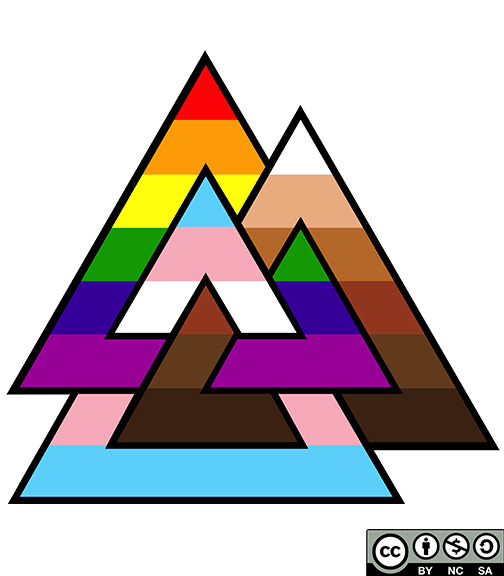

Historically (and currently) the Valknut is a symbol meaning that people are willing to sacrifice their lives for a cause. Valknut literally means "knot of the slain warrior." It's also worn by those wishing to honor a deceased friend, loved one, or fellow soldier. Unfortunately, there are some who have taken to use this for a less than noble cause.
However, there are still those who use this symbol that don't stand for hate, and so I've designed these Pride versions- because I just thought, think of how many have already died for this cause? Either fighting for it, or murdered because of it. Think about Stonewall. The AIDS crisis. Think about how many people had already risked their safety just being open about who they were, or protecting those in the lgbt+ communities. And how many still do.
And if you need examples of said warriors, here's a short video covering just some of who've died in this fight that I thought fit perfectly here:
[Thank you again to @caseyhwilkinson for showing me this video by @plantbasedbirdgirl on TikTok.]
So let's take it back from those who may use it for less than noble causes, and take this symbol to remember those who were forced to fight and are no longer with us because of it. Honor their memories.
* * *
Just like the previous designs, I'll be hosting the full-res file of this design as a free download on my Ko-Fi for people to use to make their own apparel/stickers/whatever. And also hosted on Threadless [Design 1 : Pride Valknut | Design 2 : Pride Flag Valknut] for those who can't print them on stuff themselves (or just don't feel like it) but still want something with these designs on it. Each sale will also make an automatic donation to various LGBT+ charities like the It Gets Better Project and the National Queer and Trans Therapists of Color Network.
I'll be making more of these designs and also be taking requests for a bit if there are any pride rune/Norse designs anyone might want to see made, feel free to just drop them in my ask box!
#pride#pride month#norse#norse pagan#norse paganism#trans#trans flag#bipoc lgbt#bipoc#pride flag#ace#asexual pride#trans pride#nonbinary#genderfluid#intersex#bisexual pride#gay pride#lesbian pride#pansexual pride#valknut#lgbt#lgbtqia#lgbt pride#queer
135 notes
·
View notes
Text
I'm just mourning everything that Izzy could have been and that he won't become because they killed him.
His character gave me so much hope. An older queer man, finding meaning, redemption, acceptance, even love in many ways, having his chance at happiness and all of that was taken away from him and from us and that's what's making me the f*cking saddest.
I'm just so tired of all this hurt and this emphasis on big dramatic plots that's going to rip your heart out in media these days. I had a lot of hope for Our Flag Means Death because it was supposed to be kind, comedic even, despite the violent pirate universe, and I once again allowed myself to feel for a character, to get invested, trusting that it was gonna be ok, but it wasn't and I do feel betrayed.
I kinda wish I hadn't watched the show, because I'm just that tired of being shoved drama and heart wrenching storylines in absolutely everything when I already have real life for that. I don't need more hurt.
I need more kindness, more acceptance, more it's going to be ok, more happiness.
And I don't care if it's making me sound like a child. My child self was never taught how to feel safe and I'm paying the price of it today. So yeah, I'm gonna look for feelings of safety when I consume media. For shows and movies that are going to hold my hand and tell me that everything is going to be ok in the end.
#izzy hands#sorry i had more thoughts#still feeling f*cking sad#and tired of it#ofmd#ofmd spoilers#ofmd s2#ofmd season 2
33 notes
·
View notes
Text
Gnossienne No. 5
Gnossienne No. 5, composed by Erik Satie in 1889, is Ed and Stede’s theme. It’s played at each of their important moments throughout Our Flag Means Death. When you listen to the piece in full, it’s like someone keeps starting the piece and messing up a little so they start all over again, and each scene experiments with a different instrument during a different segment of the piece, like flute or harpsichord. It remains tentative but each time it’s a little more hopeful, a little more determined, a little more wistful. Ed and Stede are revealing little bits of themselves to each other, checking in and reaching out towards each other’s vulnerabilities and offering safety, exploring what they mean to each other. But the base notes, their connection and chemistry, always stay a steady anchor. The whole piece is a bit sloppy and giddy and all over the place yet always comes back to the same notes and the same progression. They can’t quite place their finger on what's happening so the music can’t resolve in a satisfying way, but each time it becomes clearer and more complete until the end of the song which is played during the scene where they kiss and they’ve finally figured out how to play all the notes and it’s beautiful. It’s like this culmination of everything the performer has been trying to communicate and finally gets right- but it’s still cut a bit short.
I've talked before about how often the show is in conversation with creative works that signal shifts towards modernism, which is apt for a show that famously and hilariously plays with time periods and shifting 1717 up with anachronistic modernisms. It's true in its references to literature and painting, and it's true of music as well. Satie was experimental for his time, taking inspiration from impressionist painters like Monet who endeavoured to create reflections of the ordinary and the real that were non-static and moving, in both senses of the word. He's sometimes described as the spiritual father of minimalism, whose compositions @unadulteratedkr calls "subversive in its relative simplicity." While giving me some context for Satie, she told me that while his notations indicate that performers should leave room for poetry in their expressions of the music, he insisted the tempo remain modéré, meant at the tempo of the human heart. The bohemian was a truly hopeless romantic who proposed to the painter Suzanne Valadon on their very first night together. He wrote her songs and she painted his portraits, and when she left him after 5 months, he was so devastated that he wrote of being left with “nothing but an icy loneliness that fills the head with emptiness and the heart with sadness.” She was supposedly his only ever known love affair.
Gnossienne No. 5 dovetails OFMD's minimalist approach to romance, where the sweeping and swelling feeling of falling in love is left to speak for itself in its understated, clumsy simplicity. The piece is experimental in the way that the show is experimental, stripping the queer love story down to its rawest most basic components without being weighed down by oppressive forces or grand expectations. It allows for comedy and lightheartedness and the experimental nature of becoming friends to lovers. It’s their song through and through. I’m sure we can expect it to play at their wedding, and we will all dutifully cry our eyes out.
#our flag means death meta#ofmd meta#our flag means death analysis#ofmd analysis#our flag means death#ofmd#edward teach#stede bonnet#ed x stede#blackbonnet#gentlebeard#gnossienne no. 5#erik satie#classical music#classical composers#david jenkins
602 notes
·
View notes